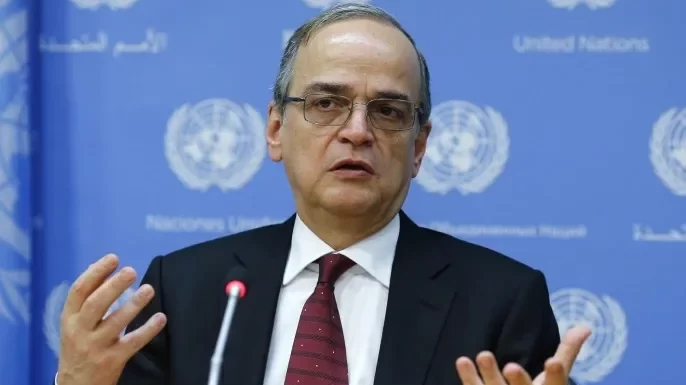Hadi al-Bahra, joint chairman of the Constitutional Committee from the opposition’s negotiating body, said that the Syrian regime’s real objective is to bypass the entire political process. It intends to eliminate the Geneva process.
“Bashar al-Assad is not looking to re-establish his legitimacy; instead, he is seeking to impose acceptance of him as a fait accompli,” Bahra told The New Arab. “Assad’s goal is to remain in power. He wants to start the reconstruction process so that he and his corrupt circle of cronies will return to plunder the country again.”
In Bahra’s view: “What currently stands in the way of this plan is to keep the political process in Geneva, which is provided for under UN Resolution 2254, alive. It should not be allowed for the process to be overridden as the only framework for any sustainable political solution.”
Read Also: UAE Calls on Security Council to Reconsider Handling of Syria
“The regime will hinder the Constitutional Committee’s work, along with any action aimed at finding a political solution. The regime cannot participate in drafting a constitution that would end its tyranny and criminality, and restore the people to their position of sovereignty and the ultimate source of all political power,” he said.
Bahra believes that the Geneva meetings “prevent the regime from standing alone in representing the usurped Syrian state. It keeps the revolution in place, with its legitimate demands, and prevents the regime’s acceptance as a fait accompli. The process keeps alive the demands and aspirations of the people who revolted. And we are negotiating with the international community, not the regime whose intentions are hidden.”
Bahra said that the committee is working to make appropriate preparations for other potential options, which can achieve the objectives of the negotiating process itself. He noted that “all other tracks, military and otherwise, all rely on the political track.”
“There are those who call for a halt to the political process in Geneva and the intention to stop the process’ active component: the Constitutional Committee. They assume that, if this is done, it will force the binding implementation of UN Resolution 2254 — or that negotiations will be required to form a transitional governing body,” he said.
“This viewpoint diverges significantly from the reality of the international community and current conflicts. This is because international resolutions, even if they are issued by the Security Council — if not under Chapter VII and specific mechanisms for the enforcement of these resolutions — are implemented only if there is consensus and international will to do so.”
“I was hoping that (the resolutions) would have had the opposite effect, such as returning the Golan Heights to Syria years ago and we would have achieved safety in Syria by enforcing previous resolution 2118 of 2013.”
“Keeping UN Resolution 2254 alive as a framework for any political solution is at stake at the moment. This step is required to ensure that the aspirations and demands of our people for justice and political transition are not overrun, and to prevent some countries from accepting the fait accompli, as the regime wants,” he said.
“The existence of active and lively meetings in Geneva contributes significantly to blocking some states from scrambling to deal with the regime as the de facto entry point,” he said.
“The regime’s evasiveness —including its evasion of the political process’ benefits and obstruction of the constitutional committee from completing some of its roles — may last for some time. But the regime cannot continue with this approach for long,” he said.
With regard to the option of withdrawal, Bahra said: “For us, we will certainly not accept the continuation of the obstructive policy; nor will we accept staying the course without results and a clear and specific timetable. We are working within our institutions on several areas that support the implementation of UN Resolution 2254 in other ways, which can lead to the activation of the political process in Geneva — as it should be”.
Pedersen described the result following the end of the fifth round of talks as “disappointment.” He indirectly blamed the regime for this outcome, before restating his hope and optimism for a breakthrough in the subsequent rounds, including the expected eighth round of talks.
“The next round is scheduled for May 28th,” Pedersen said. He added that UN Deputy Envoy Khawla Matar has “visited Damascus to ensure compliance with the fundamental requirements for holding the next round (of talks).”
This article was translated and edited by The Syrian Observer. The Syrian Observer has not verified the content of this story. Responsibility for the information and views set out in this article lies entirely with the author.


